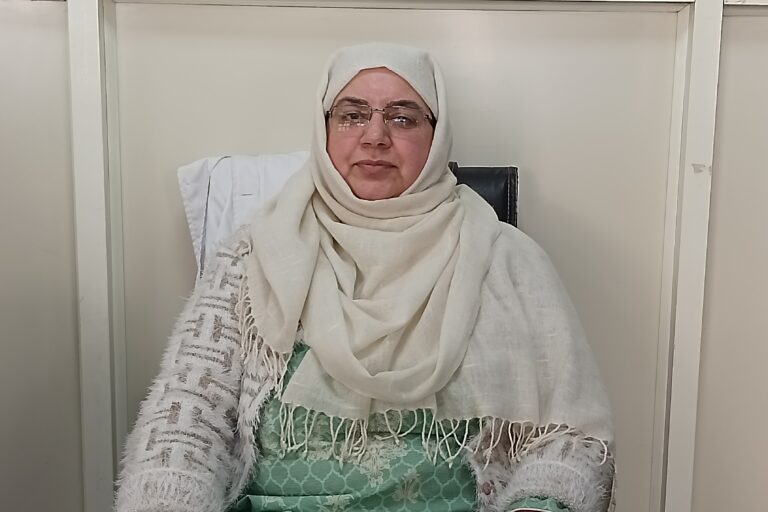Dr. Aaliya, a dental surgeon at the Government District Hospital, Ganderbal, with over 25 years of experience, in a chat with Rising Kashmir shares her insights on the importance of oral health and preventive care.
What are the factors that contribute to oral health problems?
There are several factors that can contribute to poor oral health. These include poor oral hygiene practices, such as infrequent brushing and flossing, and a diet high in sugary and acidic foods. In addition, smoking and tobacco use can significantly increase the risk of oral health problems, including gum disease and oral cancer.
How often should one visit the dentist for a checkup and cleaning?
It is recommended to visit the dentist for a check-up and cleaning every six months. However, people with specific dental concerns or conditions may need more frequent visits as advised by their dentist. Regular dental visits help detect and prevent dental problems before they become more serious.
What steps can people take to improve their oral health?
There are many steps people can take to improve their oral health. First and foremost, it is essential to practice good oral hygiene with regular brushing and flossing. In addition, maintaining a healthy diet low in sugary and acidic foods can help prevent tooth decay. Finally, avoiding the use of tobacco and visiting the dentist regularly for examinations and cleanings are also important for maintaining good oral health.
Are there any new developments or technologies in the field of dentistry that you are particularly excited about?
Yes, there have been many exciting developments in dentistry in recent years. One area I am particularly excited about is the use of digital technology in dental care. Digital x-rays, for example, allow us to take high-resolution images of teeth and gums with less radiation exposure than traditional x-rays. In addition, advances in dental implant technology have made it possible to create customized restorations for patients with missing teeth.
How do you promote oral health awareness and provide accessible care to the community?
At Government Hospital we work hard to promote oral health awareness and provide accessible care to the community. We educate patients about the importance of good oral hygiene and regular dental checkups. In addition, we offer affordable dental services to patients of all ages, regardless of their ability to pay.
What do you think are some of the biggest challenges facing the dental industry?
One of the biggest challenges facing the dental field is the lack of awareness about the importance of oral health. Many people do not realize that oral health is closely related to overall health and well-being. In addition, there is a shortage of trained dental professionals and limited access to dental care in rural areas.
How can one distinguish a toothache from a serious dental problem?
Distinguishing between a normal toothache and a serious dental problem can be difficult without a professional examination. However, signs of a more serious problem may include persistent pain, swelling, fever, or sensitivity to hot and cold.
What causes toothaches and how can they be relieved at home?
Common causes of a toothache include tooth decay, gum disease, tooth fractures or an abscess. Home relief methods may include rinsing with warm salt water, over-the-counter pain relievers, and avoiding hard or chewy foods.
What are the signs that a root canal is needed?
Root canal treatment becomes necessary when the pulp inside the tooth becomes infected or inflamed. Signs that indicate the need for a root canal include severe pain, sensitivity to hot and cold, swelling, and a pimple-like lump in the gums near the affected tooth.
Could you explain the process involved in a root canal treatment?
During a root canal treatment, the dentist removes the infected or inflamed pulp, cleans and disinfects the inside of the tooth, and seals it with a sealant. This procedure helps to save the tooth and relieve pain.
Are there any risks or concerns associated with a dental root canal?
A dental root canal is generally safe, but there are some risks to consider, such as allergic reactions to the filling materials, tooth sensitivity, or the filling loosening or falling out over time. Good oral hygiene and regular dental checkups can help mitigate these risks.
What role does diet play in maintaining dental health?
Diet plays a key role in maintaining dental health. Eating a balanced diet rich in fruits, vegetables and calcium-rich foods can help strengthen teeth and gums. Avoiding sugary and acidic foods and drinks can help prevent tooth decay and gum disease.
What advice would you give for maintaining good oral health?
I urge everyone to prioritize oral health as an integral part of overall well-being. Brush twice a day in the morning and before going to bed, brush your mouth five times a day, floss regularly and maintain a healthy diet. Schedule regular dental checkups, usually every six months, and cleanings, even if you’re not experiencing any problems. Early diagnosis and prevention is key to maintaining a healthy smile and avoiding more serious complications in the future.


